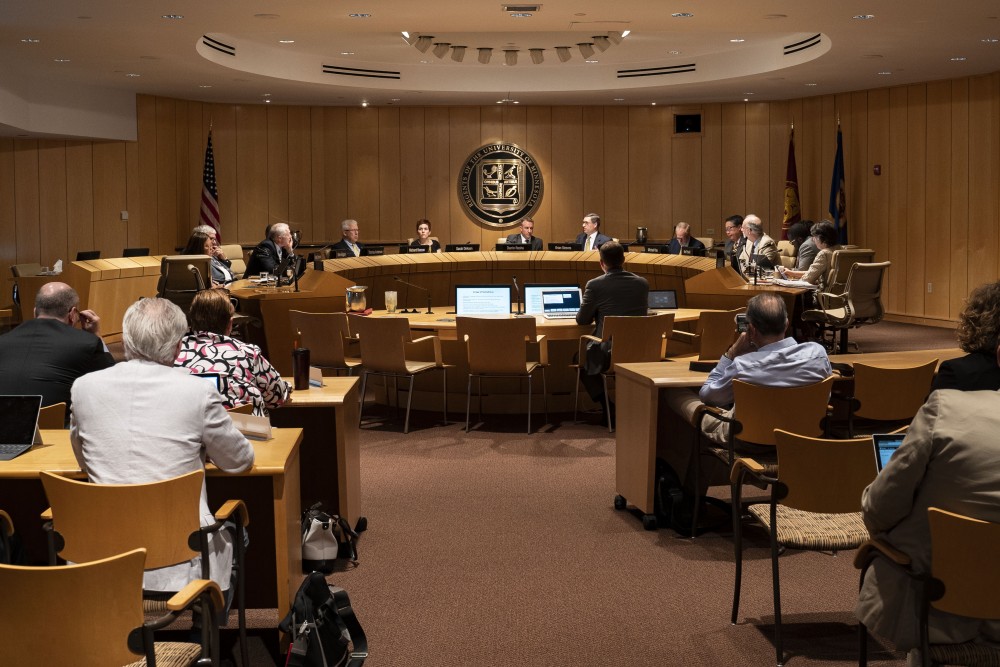After a back-and-forth discussion, the University of Minnesota Board of Regents approved an amended version of the president’s budget, featuring a 2 percent tuition increase.
The budget will go into effect July 1, the beginning of the 2020 fiscal year. Regents discussed several different tuition increases, ultimately landing on an alternative plan which President Eric Kaler detailed in a memo sent to regents Monday.
The 2 percent tuition increase comes out to $1.6 million less revenue in a near $4 billion budget. Tuition and fees for Twin Cities undergraduates will be $15,027, an increase of $337 from last year.
“This does improve affordability for some Minnesota residents,” Kaler said about the lesser tuition increase. “Hopefully, as we move forward, there will be ways to work in future years to regain those investments that we haven’t been able to make this time around.”
Regent Thomas Anderson proposed the amendment that would ultimately prevail and lower the tuition hike from Kaler’s proposed 2.5 percent to 2 percent. It passed 9-3, with Regents Darrin Rosha, Michael Hsu and Randy Simonson voting against it. The budget passed by the same vote.
Newly elected Regent Mike Kenyanya, who “reluctantly” supported the 2 percent increase, said ideally there wouldn’t be an increase at all, but taking into account what the University got from the state, it was “workable.”
“We’re voting on a budget, not tuition separately,” Kenyanya said. “Two percent was the only one, the lowest one, that had a prudent, thought-out budget.”
Kenyanya said he didn’t get to have any input on the budget creation process as he was just elected to the board by the legislature in May.
“Although it’s passed in June, it’s a year-round thing,” he said. “Hopefully I will have more influence on next year’s [budget].”
Simonson, who didn’t speak during the meeting, was disappointed with any increase at all. He supported an amendment from Hsu that would have kept tuition flat, making up the revenues from the University’s central reserves.
Simonson said after the meeting that he wants to get a strategic plan in place with President-designate Joan Gabel to address tuition hikes. He expressed a desire to keep tuition flat up front in the future, and let the administration figure out how to pay for it.
The alternative plan will make up for the lesser tuition revenue by moving $900,000 from central reserves and reducing investments in academic units by $700,000.
Kaler warned paying for a lesser increase in tuition with central reserves would hamper Gabel as she is set to take over in less than two weeks, saying the additional funds would have been “a great gift to her.”
“I think there is still room within the budget as approved for some initiatives and some new directions that she may want to pursue,” Kaler said. “But obviously, there’s not as much flexibility as there would have been with the slightly larger increase I proposed.”
Hsu proposed two amendments to the budget, one keeping tuition flat which failed 9-3, and another raising it by 1.5 percent which also failed 7-5. He lobbied for balancing the reduced revenues by dipping further into the University’s central reserves.
Kaler and Vice President for Finance and Operations Brian Burnett said they were both uncomfortable with using central reserves on a one-time expenditure.
“I’m disappointed for the students, I’m disappointed for the State of Minnesota and future students that are going to end up paying these increases, which are going to keep compounding over time,” Hsu said.
The budget features an increase in tuition of 1.5 percent for undergraduates on system campuses, adding between $156 and $182 to resident students’ annual tuition. It also increases tuition by 3 percent for graduate programs, adding $516 to the average cost per resident graduate student, according to budget documents.
















